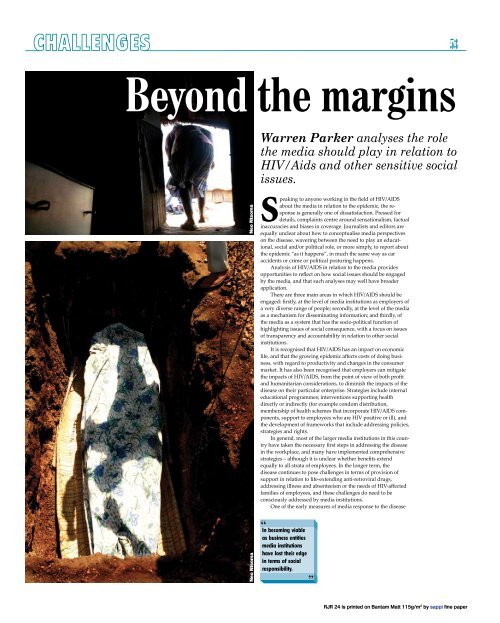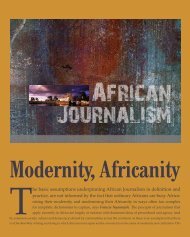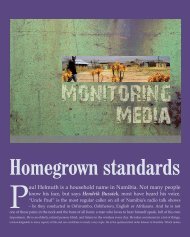FULL PDF - Rhodes Journalism Review - Rhodes University
FULL PDF - Rhodes Journalism Review - Rhodes University
FULL PDF - Rhodes Journalism Review - Rhodes University
You also want an ePaper? Increase the reach of your titles
YUMPU automatically turns print PDFs into web optimized ePapers that Google loves.
Beyond the margins<br />
Neo Ntsoma Neo Ntsoma<br />
Warren Parker analyses the role<br />
the media should play in relation to<br />
HIV/Aids and other sensitive social<br />
issues.<br />
Speaking to anyone working in the field of HIV/AIDS<br />
about the media in relation to the epidemic, the response<br />
is generally one of dissatisfaction. Pressed for<br />
details, complaints centre around sensationalism, factual<br />
inaccuracies and biases in coverage. Journalists and editors are<br />
equally unclear about how to conceptualise media perspectives<br />
on the disease, wavering between the need to play an educational,<br />
social and/or political role, or more simply, to report about<br />
the epidemic “as it happens”, in much the same way as car<br />
accidents or crime or political posturing happens.<br />
Analysis of HIV/AIDS in relation to the media provides<br />
opportunities to reflect on how social issues should be engaged<br />
by the media, and that such analyses may well have broader<br />
application.<br />
There are three main areas in which HIV/AIDS should be<br />
engaged: firstly, at the level of media institutions as employers of<br />
a very diverse range of people; secondly, at the level of the media<br />
as a mechanism for disseminating information; and thirdly, of<br />
the media as a system that has the socio-political function of<br />
highlighting issues of social consequence, with a focus on issues<br />
of transparency and accountability in relation to other social<br />
institutions.<br />
It is recognised that HIV/AIDS has an impact on economic<br />
life, and that the growing epidemic affects costs of doing business,<br />
with regard to productivity and changes in the consumer<br />
market. It has also been recognised that employers can mitigate<br />
the impacts of HIV/AIDS, from the point of view of both profit<br />
and humanitarian considerations, to diminish the impacts of the<br />
disease on their particular enterprise. Strategies include internal<br />
educational programmes; interventions supporting health<br />
directly or indirectly (for example condom distribution,<br />
membership of health schemes that incorporate HIV/AIDS components,<br />
support to employees who are HIV positive or ill), and<br />
the development of frameworks that include addressing policies,<br />
strategies and rights.<br />
In general, most of the larger media institutions in this country<br />
have taken the necessary first steps in addressing the disease<br />
in the workplace, and many have implemented comprehensive<br />
strategies – although it is unclear whether benefits extend<br />
equally to all strata of employees. In the longer term, the<br />
disease continues to pose challenges in terms of provision of<br />
support in relation to life-extending anti-retroviral drugs,<br />
addressing illness and absenteeism or the needs of HIV-affected<br />
families of employees, and these challenges do need to be<br />
consciously addressed by media institutions.<br />
One of the early measures of media response to the disease<br />
in becoming viable<br />
as business entities<br />
media institutions<br />
have lost their edge<br />
in terms of social<br />
responsibility.<br />
RJR 24 is printed on Bantam Matt 115g/m 2 by sappi fine paper<br />
3








